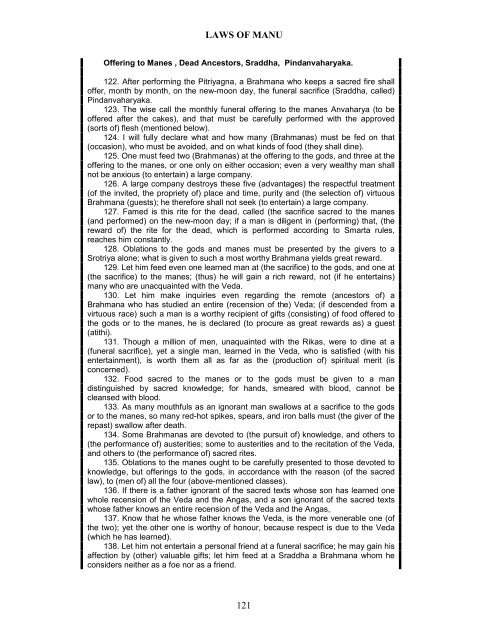You also want an ePaper? Increase the reach of your titles
YUMPU automatically turns print PDFs into web optimized ePapers that Google loves.
LAWS OF MANU<br />
Offering to Manes , Dead Ancestors, Sraddha, Pindanvaharyaka.<br />
122. After performing the Pitriyagna, a Brahmana who keeps a sacred fire shall<br />
offer, month by month, on the new-moon day, the funeral sacrifice (Sraddha, called)<br />
Pindanvaharyaka.<br />
123. The wise call the monthly funeral offering to the manes Anvaharya (to be<br />
offered after the cakes), and that must be carefully performed with the approved<br />
(sorts of) flesh (mentioned below).<br />
124. I will fully declare what and how many (Brahmanas) must be fed on that<br />
(occasion), who must be avoided, and on what kinds of food (they shall dine).<br />
125. One must feed two (Brahmanas) at the offering to the gods, and three at the<br />
offering to the manes, or one only on either occasion; even a very wealthy man shall<br />
not be anxious (to entertain) a large company.<br />
126. A large company destroys these five (advantages) the respectful treatment<br />
(of the invited, the propriety of) place and time, purity and (the selection of) virtuous<br />
Brahmana (guests); he therefore shall not seek (to entertain) a large company.<br />
127. Famed is this rite for the dead, called (the sacrifice sacred to the manes<br />
(and performed) on the new-moon day; if a man is diligent in (performing) that, (the<br />
reward of) the rite for the dead, which is performed according to Smarta rules,<br />
reaches him constantly.<br />
128. Oblations to the gods and manes must be presented by the givers to a<br />
Srotriya alone; what is given to such a most worthy Brahmana yields great reward.<br />
129. Let him feed even one learned man at (the sacrifice) to the gods, and one at<br />
(the sacrifice) to the manes; (thus) he will gain a rich reward, not (if he entertains)<br />
many who are unacquainted with the Veda.<br />
130. Let him make inquiries even regarding the remote (ancestors of) a<br />
Brahmana who has studied an entire (recension of the) Veda; (if descended from a<br />
virtuous race) such a man is a worthy recipient of gifts (consisting) of food offered to<br />
the gods or to the manes, he is declared (to procure as great rewards as) a guest<br />
(atithi).<br />
131. Though a million of men, unaquainted with the Rikas, were to dine at a<br />
(funeral sacrifice), yet a single man, learned in the Veda, who is satisfied (with his<br />
entertainment), is worth them all as far as the (production of) spiritual merit (is<br />
concerned).<br />
132. Food sacred to the manes or to the gods must be given to a man<br />
distinguished by sacred knowledge; for hands, smeared with blood, cannot be<br />
cleansed with blood.<br />
133. As many mouthfuls as an ignorant man swallows at a sacrifice to the gods<br />
or to the manes, so many red-hot spikes, spears, and iron balls must (the giver of the<br />
repast) swallow after death.<br />
134. Some Brahmanas are devoted to (the pursuit of) knowledge, and others to<br />
(the performance of) austerities; some to austerities and to the recitation of the Veda,<br />
and others to (the performance of) sacred rites.<br />
135. Oblations to the manes ought to be carefully presented to those devoted to<br />
knowledge, but offerings to the gods, in accordance with the reason (of the sacred<br />
law), to (men of) all the four (above-mentioned classes).<br />
136. If there is a father ignorant of the sacred texts whose son has learned one<br />
whole recension of the Veda and the Angas, and a son ignorant of the sacred texts<br />
whose father knows an entire recension of the Veda and the Angas,<br />
137. Know that he whose father knows the Veda, is the more venerable one (of<br />
the two); yet the other one is worthy of honour, because respect is due to the Veda<br />
(which he has learned).<br />
138. Let him not entertain a personal friend at a funeral sacrifice; he may gain his<br />
affection by (other) valuable gifts; let him feed at a Sraddha a Brahmana whom he<br />
considers neither as a foe nor as a friend.<br />
121


















